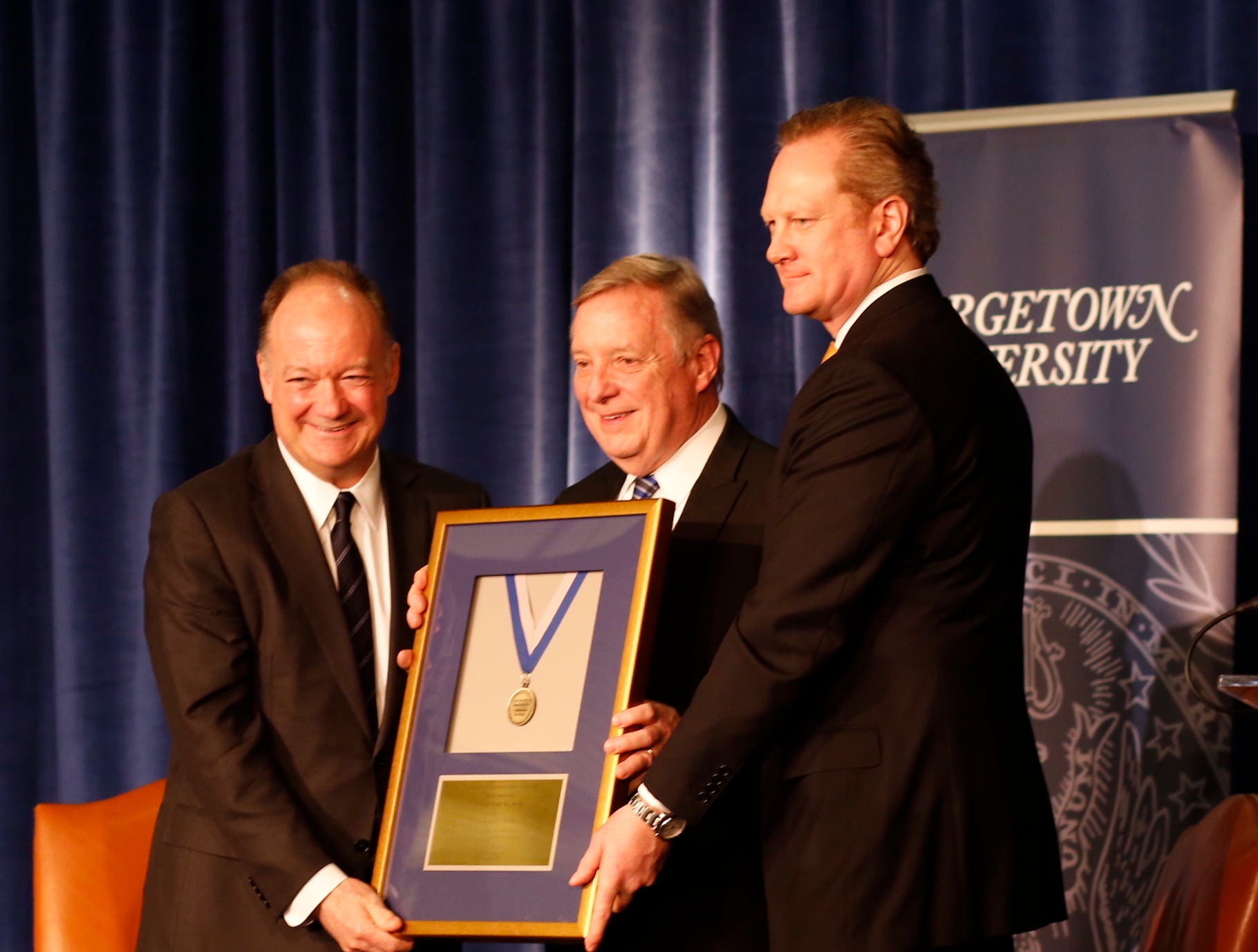On Wednesday, February 28, 2018, Georgetown honored Senator Dick Durbin (SFS‘66, L‘69) with the Timothy S. Healy, S.J. Award. Named for the 46th President of Georgetown University, the award is conferred upon alumni who have rendered outstanding and exemplary service to humanitarian causes and advancements for the benefit of mankind.
President John J. DeGioia recognized the accomplishments and legacy of Senator Durbin, saying, “Today’s awardee, like those who have come before him, exemplifies a life of service and commitment to the common good… Throughout his career, Senator Durbin has modeled civility and bipartisanship, and he has sought to ensure that we live out and live up to the values of our nation.”
Following the presentation of the award, Durbin sat down with Dean Hellman to reflect on his career in public service, his leadership involving DACA, gun control, criminal justice reform, and medical research funding, and his time as a student at Georgetown.
While at Georgetown, Durbin took advantage of the many opportunities afforded to him, both on and off campus. He acknowledged the “extraordinary teachers along the way who opened my eyes to things that my family had never dreamed of and I had never imagined. Isn’t that what education is all about?” He interned on the Hill in the office of Illinois Senator Paul Douglas, an experience that opened his eyes to the legislative workings of Capitol Hill and influenced him to pursue a career in politics. He concluded, “the education at the School of Foreign Service and at Georgetown Law prepared me for what I do today.”

Durbin is perhaps best known for his work on immigration reform. In 2001, Durbin and Senator Orrin Hatch introduced the DREAM Act, a comprehensive path to citizenship for undocumented young people who arrived in the United States as children. Cristina Velazquez (SFS‘17), is one of the many young DREAMers that Durbin has heard from as he advances the conversation about immigration reform in Congress. Last fall, he shared her story on the floor of the U.S. Senate. At the event, Velazquez reflected on the impact that Durbin has had on her life and that of other beneficiaries of the DACA program. “I remember a time when we were still in the shadows, when the term “DREAMer” did not exist. Yet, Senator Durbin has been an advocate through it all, fighting for what is right and being one of the first to bring light to an issue that is rarely spoken about. For that, I am forever grateful.”
For Durbin, the connection to immigration reform is personal. He told the story of meeting Tereza Lee, an 18-year-old constituent whose Korean parents brought her to the United States as a small child after she was born in Brazil. Because Lee’s parents were in the United States on expired tourist visas, the law required that to have a path to citizenship, Lee must first leave the U.S. for 10 years. Durbin said, “That’s not fair…she’s done everything right and struggled doing it, now she just wants a chance to do better.” As the national conversation surrounding immigration reform becomes even more partisan, Durbin continues to fight for DREAMers and their right to a clean path to citizenship. Going forward, he hopes for support from the executive branch. “There’s some skepticism about where [President Trump] will end up. I hope we can get this done soon, and I hope the president will join us. I don’t think we can do it without him.”
In an environment where careers in public service are increasingly undervalued, Durbin addressed young people with some words of advice. “Don’t be discouraged. We need you more than ever…The values that you’re picking up here at Georgetown can make a difference in this nation and in this world.”
 Durbin concluded, “to be part of a decision process that gives Cristina a fighting change, to be part of a decision process that puts money into medical research that’s going to help people who’ve never heard of Durbin, to put my life into criminal justice reform and do something right for a country that’s made some serious mistakes on the issue of race and incarceration, that to me is worth all the bad parts of the job — and every job has them.”
Durbin concluded, “to be part of a decision process that gives Cristina a fighting change, to be part of a decision process that puts money into medical research that’s going to help people who’ve never heard of Durbin, to put my life into criminal justice reform and do something right for a country that’s made some serious mistakes on the issue of race and incarceration, that to me is worth all the bad parts of the job — and every job has them.”
